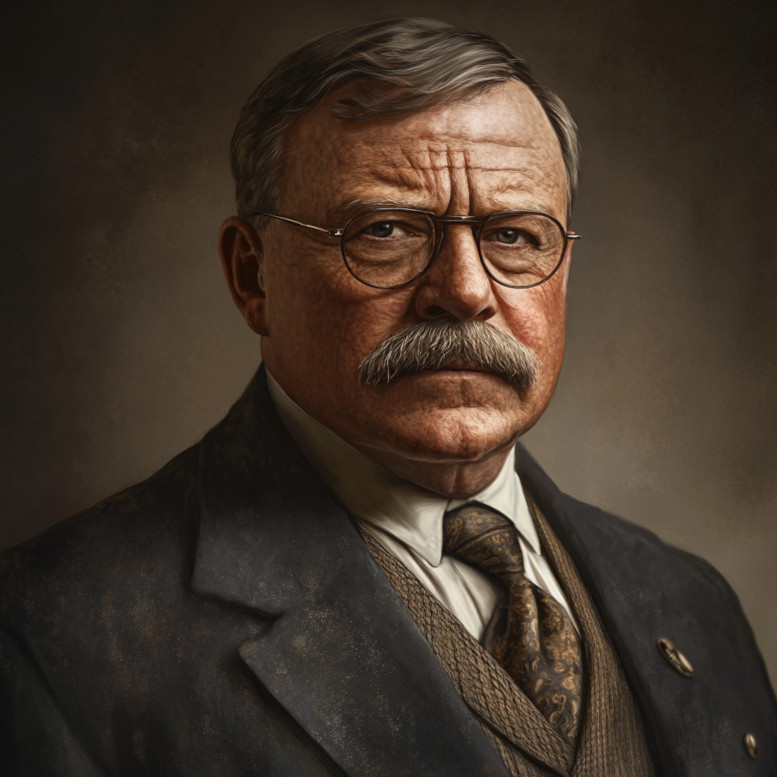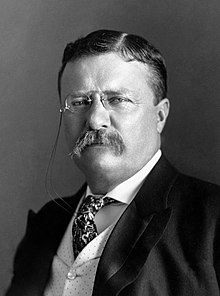xPresident of the United States
Theodore Roosevelt (1858–1919) was the 26th President of the United States, serving from 1901 to 1909. A statesman, conservationist, soldier, and writer, Roosevelt is remembered as one of America's most dynamic and influential presidents. His presidency is marked by his commitment to progressive reforms, his robust foreign policy, and his efforts to conserve the nation's natural resources. Roosevelt's larger-than-life personality, tireless energy, and "bully pulpit" approach to leadership made him a central figure in American politics at the turn of the 20th century.
Early Life and Education
Birth and Family Background: Theodore Roosevelt Jr. was born on October 27, 1858, in New York City to a wealthy and prominent family. His father, Theodore Roosevelt Sr., was a successful businessman and philanthropist, while his mother, Martha "Mittie" Bulloch Roosevelt, hailed from a Southern plantation-owning family. Roosevelt was the second of four children, and his upbringing was marked by privilege, but also by challenges, including severe asthma that plagued him throughout his childhood.
Education and Early Interests: Despite his health issues, Roosevelt was a precocious and curious child who developed a passion for reading, natural history, and physical fitness. Determined to overcome his physical frailties, he engaged in rigorous exercise and outdoor activities, which became central to his philosophy of "the strenuous life." Roosevelt was educated at home by tutors and later attended Harvard College, where he studied a wide range of subjects, including history, biology, and languages. After graduating from Harvard in 1880, he attended Columbia Law School but left before completing his degree to pursue a career in public service.
Early Political Career and Personal Tragedies
Entry into Politics: Roosevelt entered politics at a young age, winning election to the New York State Assembly in 1881 at the age of 23. As a state legislator, he quickly gained a reputation for his reformist zeal and his efforts to combat corruption. Roosevelt was a member of the Republican Party but often found himself at odds with the party's establishment, advocating for progressive policies and good government.
Personal Tragedy: In 1884, Roosevelt suffered a devastating personal loss when his wife, Alice Hathaway Lee Roosevelt, and his mother, Mittie, died on the same day—February 14, 1884. Distraught, Roosevelt retreated to the Badlands of North Dakota, where he lived as a rancher and cowboy. This period in the West allowed him to recover from his grief and reinforced his love for the outdoors and the frontier spirit.
Rise to National Prominence
Return to Public Life: After his time in the West, Roosevelt returned to public life and held several important positions, including serving as a U.S. Civil Service Commissioner (1889–1895), New York City Police Commissioner (1895–1897), and Assistant Secretary of the Navy under President William McKinley (1897–1898). In each of these roles, Roosevelt demonstrated his commitment to reform and his belief in the importance of strong, ethical leadership.
Spanish-American War and the Rough Riders: Roosevelt's national fame grew during the Spanish-American War in 1898, when he resigned his position as Assistant Secretary of the Navy to form the Rough Riders, a volunteer cavalry regiment. Roosevelt and the Rough Riders gained widespread acclaim for their charge up San Juan Hill in Cuba, a key battle in the war. His leadership and bravery during the war made him a national hero and bolstered his political career.
Governor of New York: Riding the wave of his newfound popularity, Roosevelt was elected Governor of New York in 1898. As governor, he continued his push for progressive reforms, including labor rights, corporate regulation, and conservation measures. His success as governor further elevated his national profile and set the stage for his rise to the presidency.
Presidency (1901–1909)
Vice Presidency and Assumption of the Presidency: In 1900, Roosevelt was selected as the running mate of President William McKinley, who was seeking re-election. McKinley and Roosevelt won the election, but McKinley's assassination in September 1901 thrust Roosevelt into the presidency at the age of 42, making him the youngest person to hold the office in U.S. history.
Square Deal and Domestic Reforms: Roosevelt's presidency was characterized by his commitment to what he called the "Square Deal," a domestic program focused on three key principles: conservation of natural resources, control of corporations, and consumer protection. Roosevelt believed that the federal government had a responsibility to ensure fairness in the economy and to protect the public from the excesses of big business.
Trust-Busting: Roosevelt became known as a "trust-buster" for his efforts to break up large monopolies and regulate corporate power. He used the Sherman Antitrust Act to take legal action against several major corporations, including the Northern Securities Company, which he successfully dissolved in 1904. Roosevelt's actions helped establish the precedent that the federal government could intervene in the economy to prevent monopolistic practices.
Labor and Social Reforms: Roosevelt was also an advocate for labor rights and social justice. He intervened in the 1902 coal strike, mediating a settlement that improved conditions for workers and established the principle of federal arbitration in labor disputes. He supported progressive legislation, such as the Pure Food and Drug Act and the Meat Inspection Act, both passed in 1906, which aimed to protect consumers and improve public health.
Conservation: One of Roosevelt's most lasting legacies is his commitment to conservation. He established the U.S. Forest Service, created five national parks, and signed into law the Antiquities Act, which allowed him to designate national monuments. During his presidency, Roosevelt set aside over 230 million acres of public land for conservation, including national forests, wildlife refuges, and monuments, laying the foundation for the modern conservation movement.
Foreign Policy and the Roosevelt Corollary: Roosevelt's foreign policy was guided by the principle of "speak softly and carry a big stick," meaning that the U.S. should strive for peace but be prepared to use military power to defend its interests. He expanded the U.S. Navy, known as the "Great White Fleet," and projected American power abroad.
Panama Canal: One of Roosevelt's most significant foreign policy achievements was the construction of the Panama Canal, which he facilitated by supporting Panama's independence from Colombia. The canal, completed in 1914, became a vital strategic and economic asset for the United States, connecting the Atlantic and Pacific Oceans.
Roosevelt Corollary: In 1904, Roosevelt articulated the Roosevelt Corollary to the Monroe Doctrine, asserting the right of the United States to intervene in the affairs of Latin American countries to maintain stability and order. This policy justified several U.S. interventions in the region and reinforced America's role as a dominant power in the Western Hemisphere.
Nobel Peace Prize: Despite his reputation as a vigorous and sometimes aggressive leader, Roosevelt also played a key role in promoting peace. In 1905, he mediated the Treaty of Portsmouth, which ended the Russo-Japanese War. For his efforts, he was awarded the Nobel Peace Prize in 1906, becoming the first American to receive the honor.
Post-Presidency and Later Years
The Progressive Party and the 1912 Election: After leaving office in 1909, Roosevelt remained active in politics. He became increasingly disillusioned with his successor, William Howard Taft, whom he believed had abandoned progressive principles. In 1912, Roosevelt ran for president again as the candidate of the Progressive Party, also known as the "Bull Moose Party," after losing the Republican nomination to Taft. His candidacy split the Republican vote, leading to the election of Democrat Woodrow Wilson. Despite the loss, Roosevelt's campaign brought progressive issues to the forefront of American politics.
Explorations and Writing: After his defeat in 1912, Roosevelt embarked on an expedition to the Amazon rainforest, during which he nearly died from a tropical illness. He also continued to write prolifically, authoring books on history, politics, and nature, and contributing to magazines and newspapers. His writing and speeches continued to influence public opinion and policy debates.
World War I and Final Years: During World War I, Roosevelt was a vocal advocate for U.S. involvement in the conflict and criticized President Wilson's initial policy of neutrality. He also urged military preparedness and sought to raise a volunteer division, though Wilson denied his request to serve. The war took a personal toll on Roosevelt, as his youngest son, Quentin, was killed in combat in 1918. The loss deeply affected Roosevelt, who never fully recovered from the grief.
Death and Legacy
Theodore Roosevelt died in his sleep on January 6, 1919, at his home, Sagamore Hill, in Oyster Bay, New York, at the age of 60. His death was mourned across the country, and he was remembered as one of the most energetic and influential leaders in American history.
Legacy: Theodore Roosevelt's legacy is vast and multifaceted. He is remembered as a champion of progressive reform, a visionary conservationist, and a bold leader in both domestic and foreign policy. Roosevelt's efforts to expand the role of the federal government in regulating the economy, protecting natural resources, and ensuring social justice helped shape the modern American state. His assertive foreign policy laid the groundwork for the United States' emergence as a global power in the 20th century.
Roosevelt's life and career have inspired generations of Americans, and his image is immortalized on Mount Rushmore alongside George Washington, Thomas Jefferson, and Abraham Lincoln. His belief in the "strenuous life" and his dedication to public service continue to resonate as core elements of American identity.
Theodore Roosevelt was one of the most dynamic and influential figures in American history. His presidency marked a turning point in the development of the modern state, as he championed progressive reforms, conservation efforts, and a strong, active government. Roosevelt's legacy as a leader who embodied the spirit of determination, courage, and public service endures, making him one of the most celebrated and admired presidents in U.S. history.



